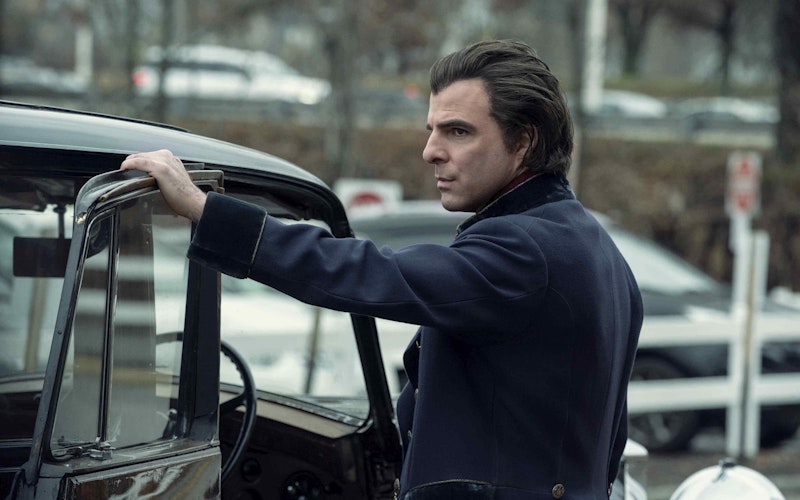
TV
NOS4A2 and Biblical Vampirism
Why doesn't anyone ever talk about the vampire in Proverbs?
That's all I can think as I make my way through the second (and likely final) season of AMC's sort-of vampire show NOS4A2. The title of the show is a play on the word "nosferatu," popularized by Bram Stoker’s 1897 novel Dracula. In the series, the main antagonist Charlie Manx (Zachary Quinto) drives a 1930s Rolls-Royce Wraith whose vanity license plate reads NOS4A2. It's something of a misnomer, as Manx is not a classical vampire. Nevertheless, NOS4A2 uses its monster as all good horror does: to illustrate profound truth about how we were created to live together and the cost of choosing to put ourselves at odds with that path.
NOS4A2 is based on the book of the same name by Joe Hill (son of Stephen King), which tells the story of a young woman named Vic McQueen (played in the show by Ashleigh Cummings) and her battle against Manx. Season 1 centered on Vic's experience as a traumatized teen, with Charlie Manx representing all the dangers the world holds for kids. Season 2 finds Vic all but married and with a child of her own (named Bruce Wayne Carmody and played by Jason David). This half of the story is about how we pass trauma on to our children (the first episode is called "Bad Mother"). Cummings ably reintroduces us to Vic, who cannot shake the fear that Charlie Manx is still out there, despite having burned him nearly to death at the end of the first season.
Of course, it turns out she's correct. Though Manx is not a vampire in the traditional sense, he has discovered a path to immortality. In the mythology of NOS4A2, Manx’s Wraith allows him to drain the life force of children, keeping him youthful while trapping their souls in an eerie netherworld he calls Christmasland. So long as the Wraith remains intact, Manx remains alive (even though he'll age if he doesn't feed). And, as Vic learns in Season 2, if the Wraith is repaired, Manx will return from death to exact vengeance.
In his own way, Manx embodies the monstrous nature of vampirism. Living in the shadow of Stoker, we are most familiar with the European vampire, who is undead, having traded his soul for immortality—an eternal life that can only be had by feasting on the blood of others. But European culture isn’t the only source of stories of monsters who live at the expense of others. In the ancient Near East, the monster was not male, but female and often had evil daughters. She was called Aulak in Arabic and Alukah in Hebrew and is referenced in a wisdom riddle near the end of Proverbs:
“The leech has two daughters.
‘Give! Give!’ they cry.
“There are three things that are never satisfied,
four that never say, ‘Enough!’:
the grave, the barren womb,
land, which is never satisfied with water,
and fire, which never says, ‘Enough!’
The riddle is about things that take, all embodied by the monstrous leech-woman and her needy daughters. The proverb invites us to reflect on the cry of those daughters: "Give! Give!"
Manx embodies the monstrous nature of vampirism.
"Give! Give!" is the heartbeat of vampirism. What makes vampires monstrous is that, no matter what culture, they live at the expense of the other. It's no accident that the European vampire, formed from traditions steeped in Christianity, drinks blood. At the heart of the Christian faith is the confession that we are saved by the blood of another—Jesus himself. The vampire is the one who steals, kills, and destroys. He willingly sacrifices the innocent to seize for himself eternal life. Jesus invites us into a different way: he is the innocent one who gladly gives up his own life in order to give others eternal life. No wonder vampires can't tolerate the cross.
Like the best villains, NOS4A2’s Manx has managed to convince himself he is the hero of the story. He preys specifically on children who come from broken, neglectful, and abusive homes. When he invites the children to join him in Christmasland, they usually jump at the chance to escape their circumstances. They smile as the Wraith drains their life, transforming them into demonic echoes of their former selves. And they haunt Christmasland, never growing old and playing dark games that reveal their new nature.
Manx positions himself as a champion of children, righteously punishing bad parents. But his battle with Vic reveals him as a fraud. There's no question Vic is troubled. Her trauma manifests as alcoholism. She hates herself, and because she hates herself, she can't receive the love of her partner Lou (Jonathan Langdon) or her son Wayne. But even so, when Manx returns, Vic will stop at nothing to protect Wayne from his predatory grasp. In this, Vic and Manx become mirrors of each other. Both are relentless in their pursuit of children. Both claim they only want the best for said children. Yet Vic chooses to stay, when running would be easier for her. She chooses to sacrifice what is best for her for the sake of what's best for Wayne. And Manx wants Wayne for revenge (on Vic) and food (for himself). His actions prove the lie of his words.
We've always told stories about monstrous creatures that feed on innocents. Embedded in those tales is a recognition that God created us to mirror God's own self-giving love. When we choose to live selfishly, we become monstrous. When we choose to live selflessly, we find the way of the cross, that invitation to imitate our Good Parent in Heaven.
Topics: TV